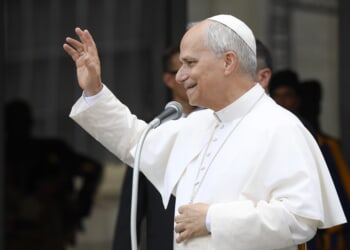The Conservative Party is, and has long been, a broad church. Its exact breadth and where the leftward and rightward limits of the church lie are up for debate but, as befitting a major party in the two-and-change party system we until recently had, its default setting was pretty wide.
One wonders whether Nadine Dorries, who has this morning announced her defection to Reform UK, may not come in retrospect to appreciate that more than she currently does.
There are, to be sure, particular conditions to her deep dissatisfaction with the Tories – to whit, its shocking temerity in disposing of the services of Boris Johnson before he was quite done with it and in particular its failure to make her a peeress. It was in pursuit of the latter cause that she notably refused to quit the Commons several months after she definitively stopped doing her job.
Nigel Farage would do well to bear that latter saga in mind. Conservative defections pose something of a dilemma for him anyway: on the one hand, it provides a media sugar-rush and a sense of momentum; on the other, it obviously muddies the very clear line he is trying to draw between Reform UK and the previous government. But to that has to be added the basic problem of quality control.
Then there is the problem posed by big personalities, of which Dorries is most certainly one. Johnson, whose attitude towards Reform commentators are already trying to divine from her defection, is another.
So too is Farage – and he has repeatedly made it very clear that his parties only have room for one. Reform policy is set by him and him alone. Even expressing a private policy view which contradicts the leader’s, as did Sarah Pochin recently on ID cards, is enough to cause controversy.
That is not, to put it mildly, the sort of environment in which Dorries is used to operating – and on issues such as the Online Safety Act, which Farage deplores and of which she was a major architect in government, the two are miles apart. Having been so strong-willed on the subject as a minister, would Dorries be prepared to recant that position for a place in the Reform tent?
Perhaps it won’t come to that. Farage has said that her defection “will be a great boost to our campaign to win the next general election”, but he hasn’t said how. It isn’t a given that Dorries is going to make another run for the Commons, although she would presumably be very willing to be drafted if Reform did form a government and had suddenly the need to make a couple of hundred appointments to the Lords.
It may even be simply that publicly defecting offered Dorries an increasingly rare opportunity to win headlines and twist the knife in a party she has pretty obviously come to despise. It casts a bleak spotlight on the current state of the Conservative Party that her defection, granted pride of place in the cover of this morning’s Daily Mail, is a rare instance of anything to do with the party making headlines.
But regardless of this specific case, the broader challenge of maintaining and defining the ‘broad church’ remains, for both parties – although it manifests differently in each.
For Reform, the question is whether they can become one at all. Farage is trapped in a paradox of his own making: his control-freak tendencies are often more than understandable when one considers the gulf in political ability between himself and his colleagues; but that gulf exists in no small part because able and strong-willed people don’t tend to join personality cults, and of the pool of people who are willing to join them, only a smaller number will be easily able to transfer their loyalty from one to another (from Johnson to Farage, say).
The Conservatives, meanwhile, face a different problem: setting the limits on the broad church. For there must be limits, lest the whole thing lost any sort of coherence, especially on whichever issues are the defining issues of the day. There is little merit even in good times of a party consenting to see elected under its own colours MPs who will not reliably vote for its programme on those issues – to do so when its very future is in existential peril, and there is no prospect of winning a large majority anytime soon, is pure recklessness.
Of course, deciding how much deviation from party positions to allow on this or that subject is only really possible when the party has positions on those subjects, and here again we run into the problems posed by Kemi Badenoch’s deliberately-amorphous leadership pitch and the glacial pace of the policy review. But if the Party is ever to have a shot a recovery, it must at some point abandon the delaying tactic of maintaining unity through evasion and settle down to some of the ideological battles that came due in 2024.
The result would be, at least in the short term, a smaller church, at least on issues such as the ECHR, and another pool of potential defectors to parties to the Tories’ left or right, as things played out. But that’s the thing about broad-church parties: if broad swaths of political territory are going to be organised into standing coalitions, which is what such parties effectively are, sometimes the important battles need to be fought inside them.
If they aren’t then, as we’ve seen, a potentially-existential internal row becomes an even-more-existential external battle against a rival party – a party which, as I’ve written elsewhere, will have a much easier time killing off the Tory Party than replacing it.





![Gavin Newsom Threatens to 'Punch These Sons of B*thces in the Mouth' [WATCH]](https://www.right2024.com/wp-content/uploads/2025/08/Gavin-Newsom-Threatens-to-Punch-These-Sons-of-Bthces-in-350x250.jpg)
![ICE Arrests Illegal Alien Influencer During Her Livestream in Los Angeles: ‘You Bet We Did’ [WATCH]](https://www.right2024.com/wp-content/uploads/2025/08/ICE-Arrests-Illegal-Alien-Influencer-During-Her-Livestream-in-Los-350x250.jpg)
![Black BET Billionaire Donor Stuns Democrats, Gives $500K to Winsome Earle-Sears [WATCH]](https://www.right2024.com/wp-content/uploads/2025/08/Black-BET-Billionaire-Donor-Stuns-Democrats-Gives-500K-to-Winsome-350x250.jpg)







